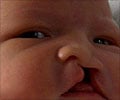Mums-to-be have been advised to eat large amount of eggs, for a new study has revealed that an essential nutrient found in eggs may help lower risk of neural tube defects.
Researchers from Stanford University School of Medicine have found that higher levels of total blood choline are associated with a 2.5-fold reduction in risk for neural tube birth defects (NTDs).NTDs are birth defects of the brain and spinal cord, and the two most common NTDs are spina bifida and anencephaly.
During the study, the researchers examined blood samples from more than 180,000 pregnant women and found 80 cases of NTDs and analysed the specimens for markers including choline, folate, homocysteine, methionine and betaine among others,
They found a 2.5-fold reduction in risk for NTDs with the highest blood choline levels
The investigators note that the cause of NTDs is very complex and that supplementation of the food supply with folic acid, though effective, is only part of the solution.
"This study is exciting because it offers new clues for preventing serious birth defects like spina bifida," said Dr. Gary M. Shaw, co-author of the study and professor of pediatrics at Stanford University School of Medicine.
Advertisement
Choline is an essential nutrient needed for many of life's most basic functions including brain and nerve function, liver metabolism, the transportation of nutrients and the normal functioning of every cell in the body.
Advertisement
There is a high rate of choline transfer from mother to fetus and breast milk is also rich in choline, so meeting maternal choline needs is very important.
Studies have shown that age-associated memory decline was delayed in offspring when mothers' diets are supplemented with choline during pregnancy. The risk of developing breast cancer was 24 percent lower among women and also protected from cardiovascular risk.
The study appears in the journal Epidemiology.
Source-ANI
SRM














